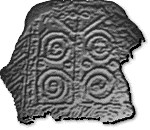 Those familiar with the Celts divide them up into three categories: the Scottish, the Irish, and the Welsh. However, for a long time there was another group called the Picts who were, for centuries, the most powerful inhabitants of the British Isles. Today however, much about them remains a mystery, with hardly any record of them after the mid-9th century AD.  Pictland, as the Pictish homeland was called, was made up of a large area of what is now modern day Scotland, mainly in the low-lying coastal areas of Eastern Scotland where they sustained themselves through fishing and farming. The Picts weren't any one particular race or culture per se, but a military alliance which was formed around 100 AD to defend against the Roman invaders. The name Pict itself is believed to be derived from the Latin word Picti, "the painted men". In fact, the Pictish nation out-lasted the would-be conquerors and predated the formal organization of both the Scots and Irish. Historical and archaeological records also show that they were also quite fierce warriors, judging by accounts of those (like the Scots and the Irish) whom they defeated in battle. They were the dominant military power in that area for almost 500 years. The language which they spoke is believed to have been similar to the modern day Welsh language, fitting into a category which linguists call the "P-Celtic" languages, while modern Gaelic and Irish are considered "Q-Celtic". Not much is actually known about their dialect because the Picts didn't keep written records, but even today many Pictish place names still exist in Scotland. Almost all of what is now known about them is from accounts of others and the few artifacts the Picts themselves left behind. Chief among these were ornate carved stones which represent some of the high points of Celtic art. There are inscriptions on the stones written in an alphabet called Ogham, variations of which were also used by the Scots and Irish. Although the inscriptions of their Celtic counterparts have been translated, there has yet to be any successful translation of the Pictish Ogham.
The Picts shared much in common with their fellow Celts, such as
geography, similar language, and similar art, among other things. There were some differences however, the main one being that descent for the Picts was defined in terms of the mother rather than the father ie. matrilineal rather than patrilineal. Historical records suggest that this is what led to their disappearance, or rather their assimilation by the Scots.
Because of the way in which Picts handled descent, the Scots were able
to gradually absorb them through marriage. Although it is generally accepted by historians and archaeologists that the Picts merged with the Scots, exact details aren't known. And with the exception of second hand accounts, there is almost no information about the Picts themselves. Because of their unique social and historical characteristics, the Picts have continued to be one of history's most intriguing mysteries. SBB, October 1999 Links |
Thursday, December 26th, 2019
Attention visitors: Tartans.com is back. Please note that this is a snapshot of the site as it existed nearly 20 years ago and you may encounter broken links; we are still combing through the site and correcting those as we find them. Please also note that some sections are currently not functional, primarily the discussion forums/clan chat boards.
|
** HOME - First Time Visitors - Glossary - - Contact Us ** Awards | Bibliography | Clan Calendar | Clan Chat | Clan Finder | History | Famous Scots | Genealogy | Great Hall of the Clans | Links | News and Features | Scots on the Net | Search | Site Map The Gathering of the Clans
Copyright 1995- Tartans.com - All Rights Reserved. |
 Despite their lack of written records, the Picts were quite advanced
culturally and artistically. Between the 5th and 7th centuries AD most
of them were converted to Christianity and this was reflected in the
sculptures of the period. Their art retained most of its traditional
elements, but they also began to add crosses and other Christian
symbolism.
Despite their lack of written records, the Picts were quite advanced
culturally and artistically. Between the 5th and 7th centuries AD most
of them were converted to Christianity and this was reflected in the
sculptures of the period. Their art retained most of its traditional
elements, but they also began to add crosses and other Christian
symbolism.